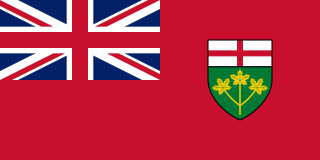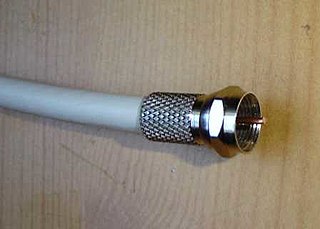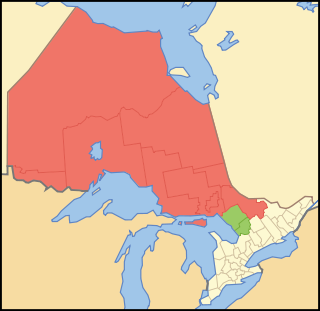Félix Baxter Ricard (1905 – 1993) was a Canadian media proprietor. [1]

Canadians are people identified with the country of Canada. This connection may be residential, legal, historical or cultural. For most Canadians, several of these connections exist and are collectively the source of their being Canadian.
A media proprietor, media mogul or media tycoon refers to a successful entrepreneur or businessperson who controls, through personal ownership or via a dominant position in any media related company or enterprise, media consumed by a large number of individuals. Those with significant control, ownership, and influence of a large company in the mass media may also be called a tycoon, baron, or business magnate. Social media creators and founders can also be considered media moguls, as such channels deliver media to a large consumer base.
Born in 1905 in Verner, Ontario, [2] he moved to Sudbury in childhood with his father Félix Ricard, who became a hardware merchant in the city and a longtime trustee on the French-language school board. [3] He married Alma Ricard in adulthood, and the couple took over management and operation of the store until moving into broadcasting. [3]

Ontario is one of the 13 provinces and territories of Canada and is located in east-central Canada. It is Canada's most populous province accounting for 38.3 percent of the country's population, and is the second-largest province in total area. Ontario is fourth-largest jurisdiction in total area when the territories of the Northwest Territories and Nunavut are included. It is home to the nation's capital city, Ottawa, and the nation's most populous city, Toronto, which is also Ontario's provincial capital.

Greater Sudbury, commonly referred to as Sudbury, is a city in Ontario, Canada. It is the largest city in Northern Ontario by population, with a population of 161,531 at the Canada 2016 Census. By land area, it is the largest in Ontario and the fifth largest in Canada. It is administratively a single-tier municipality, and thus not part of any district, county, or regional municipality.
Alma Ricard, née Vézina was a Canadian broadcaster and philanthropist. A partner with her husband F. Baxter Ricard in his broadcasting holdings, including Northern Cable and Mid-Canada Communications, after her husband's death in 1993 she became a prominent donor to institutional and educational charities.
In 1947, Ricard obtained a radio licence to establish CHNO in Sudbury, Ontario, the first bilingual radio station in Canada outside of Quebec. [1] [4] Ten years later, in 1957, he became the first commercial radio broadcaster in Canada licensed to operate two AM stations in the same city. [1] CHNO became an all-English station, and Ricard's new CFBR became the new French outlet. [5] A third station, CJMX, was established on FM in 1980.

CHNO-FM is a Canadian radio station broadcasting at 103.9 on the FM dial in Sudbury, Ontario. The station is branded on-air as Rewind 103.9 with a classic hits format.

Quebec is one of the thirteen provinces and territories of Canada. It is bordered to the west by the province of Ontario and the bodies of water James Bay and Hudson Bay; to the north by Hudson Strait and Ungava Bay; to the east by the Gulf of Saint Lawrence and the province of Newfoundland and Labrador; and to the south by the province of New Brunswick and the U.S. states of Maine, New Hampshire, Vermont, and New York. It also shares maritime borders with Nunavut, Prince Edward Island, and Nova Scotia. Quebec is Canada's largest province by area and its second-largest administrative division; only the territory of Nunavut is larger. It is historically and politically considered to be part of Central Canada.

English is a West Germanic language that was first spoken in early medieval England and eventually became a global lingua franca. It is named after the Angles, one of the Germanic tribes that migrated to the area of Great Britain that later took their name, as England. Both names derive from Anglia, a peninsula in the Baltic Sea. The language is closely related to Frisian and Low Saxon, and its vocabulary has been significantly influenced by other Germanic languages, particularly Norse, and to a greater extent by Latin and French.
In 1972, Baxter also launched Northern Cable, a cable television service for Northern Ontario. [1] In 1980, Northern Cable became the major shareholder in MCTV, when Cambrian Broadcasting and J. Conrad Lavigne's broadcast holdings were merged for financial reasons. [1]
Northern Cable was a Canadian cable television provider, which operated from 1975 to 1998.

Cable television is a system of delivering television programming to consumers via radio frequency (RF) signals transmitted through coaxial cables, or in more recent systems, light pulses through fiber-optic cables. This contrasts with broadcast television, in which the television signal is transmitted over the air by radio waves and received by a television antenna attached to the television; or satellite television, in which the television signal is transmitted by a communications satellite orbiting the Earth and received by a satellite dish on the roof. FM radio programming, high-speed Internet, telephone services, and similar non-television services may also be provided through these cables. Analog television was standard in the 20th century, but since the 2000s, cable systems have been upgraded to digital cable operation.

Northern Ontario is a primary geographic and administrative region of the Canadian province of Ontario; the other primary region being Southern Ontario. Most of the core geographic region is located on part of the Superior Geological Province of the Canadian Shield, a vast rocky plateau located mainly north of Lake Huron, the French River, Lake Nipissing, and the Mattawa River. The statistical region extends south of the Mattawa River to include all of the District of Nipissing. The southern section of this district lies on part of the Grenville Geological Province of the Shield which occupies the transitional area between Northern and Southern Ontario. The extended federal and provincial administrative regions of Northern Ontario have their own boundaries even further south in the transitional area that vary according to their respective government policies and requirements. Ontario government departments and agencies such as the Growth Plan for Northern Ontario and the Northern Ontario Heritage Fund Corporation define Northern Ontario as all areas north of, and including, the districts of Parry Sound and Nipissing for political purposes, while the federal government, but not the provincial, also includes the district of Muskoka.
Due to the CRTC's rules at the time on concentration of media ownership, Ricard's radio stations continued to operate as a separate corporation from Ricard's shares in MCTV, although they were later merged through Mid-Canada Radio in 1985. [1] In 1990, Ricard's media holdings were sold off in a series of transactions: MCTV was acquired by Baton Broadcasting, Mid-Canada Radio was sold to Pelmorex, becoming the Pelmorex Radio Network, and Northern Cable was sold to CF Cable. [6]

The Canadian Radio-television and Telecommunications Commission is a public organization in Canada with mandate as a regulatory agency for broadcasting and telecommunications. It was created in 1976 when it took over responsibility for regulating telecommunication carriers. Prior to 1976, it was known as the Canadian Radio and Television Commission, which was established in 1968 by the Parliament of Canada to replace the Board of Broadcast Governors. Its headquarters is located in the Central Building of Les Terrasses de la Chaudière in Gatineau, Quebec.
Concentration of media ownership is a process whereby progressively fewer individuals or organizations control increasing shares of the mass media. Contemporary research demonstrates increasing levels of consolidation, with many media industries already highly concentrated and dominated by a very small number of firms.
Pelmorex Corp. is a Canadian company that specializes in producing weather information websites and applications, as well as specialty television networks. Pelmorex is the parent company of The Weather Network, MétéoMédia, Alert Ready, Eltiempo.es, Clima, Wetter Plus, and formerly Beat the Traffic. The company is headquartered in Oakville, Ontario.
Ricard was also involved in the community as chairman of the Sudbury General Hospital board, as chairman of the city's 1960s urban renewal project to revitalize Downtown Sudbury, and as president of the local chamber of commerce and the local chapter of the Kiwanis Club. [6] In 1980, he received a public service award from the Central Canada Broadcasters' Association, [1] and in 1987 was awarded an honorary doctorate by Laurentian University. [1] In 1990, he was named entrepreneur of the year by the Northern Ontario Business Awards. [1]

Health Sciences North is an academic health science centre in Greater Sudbury, Ontario, Canada. HSN offers a variety of programs and services, with regional programs in the areas of cardiac care, oncology, nephrology, trauma and rehabilitation. Patients visit HSN from a wide geographic area across northeastern Ontario.

Urban renewal is a program of land redevelopment in cities, often where there is urban decay. Urban renewal often refers to the clearing out of blighted areas in inner cities to clear out slums and create opportunities for higher class housing, businesses, and more. Modern attempts at renewal began in the late 19th century in developed nations, and experienced an intense phase in the late 1940s under the rubric of reconstruction. The process has had a major impact on many urban landscapes, and has played an important role in the history and demographics of cities around the world.

A chamber of commerce is a form of business network, for example, a local organization of businesses whose goal is to further the interests of businesses. Business owners in towns and cities form these local societies to advocate on behalf of the business community. Local businesses are members, and they elect a board of directors or executive council to set policy for the chamber. The board or council then hires a President, CEO or Executive Director, plus staffing appropriate to size, to run the organization.
Ricard died in Sudbury in 1993. [1] Following his death, his widow Alma became a prominent philanthropist, and was inducted into the Order of Canada in 2000. [3]
In 1999, he was posthumously inducted into the Canadian Association of Broadcasters Hall of Fame. [1]




